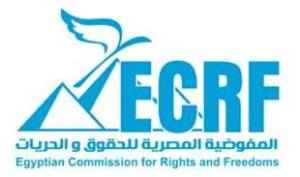On Labour Day, Private Sector Has a Responsibility to Respect Human Rights. Government Has to Guarantee Labour Rights in the Midst of Coronavirus Pandemic.
Do not Force Workers to Choose between Risking Their Lives and Losing their Livelihood due to Lack of Social Protection Measures.

1 May 2020 Labour day comes this year at a very exceptional time amid the confrontation with the coronavirus (COVID-19) pandemic. On this occasion, the Egyptian Commission for Rights and Freedoms (ECRF) reminds the Egyptian authorities of their international obligations regarding the protection of workers’ rights from injustice by putting into effect supervisory and legislative mechanisms, and formulating executive policies in order to guarantee the effective protection of healthcare workers who are at the front lines of confrontation with the coronavirus pandemic, as well as workers in the private sector and irregular workers. ECRF calls upon the Egyptian authorities to urgently investigate all human rights violations related to the crisis of the pandemic and protection of public health. Government also has to actively monitor measures taken by companies and factories in the private sector to protect workers from contracting the virus, and to insure that workers don’t lose their jobs and are not forced to work without protective equipment. ECRF underlines the role of government to support irregular workers and provide sustainable alternatives so that they have the minimum level of decent living conditions.
ECRF also confirms that private sector companies should be held responsible for the respect and promotion of human rights including respect for workers’ rights. They should not expose workers to any practices or conditions that expose their lives to any dangers or risk and should not neglect measures of protection and prevention from diseases especially in light of fears related to the widespread of the pandemic. It also affirms that it is necessary to provide workers with protection tools without discrimination and without forcing workers to bear any additional costs. It calls upon private sector companies to announce their protective and preventive measures and policies that they take against the spread of the pandemic, as well as to protect the rights of workers, and to refrain from arbitrarily dismissing them.
For example, ECRF observed deterioration in the conditions of workers in the private sector and of irregular workers in the governorates of Ismailia and Port Said. It received complaints regarding forcing workers to return to work in some locations despite warnings against the outbreak of the virus and risks to Egyptians’ lives. Moreover, it received complaints regarding negligence in the sterilization of many workplaces in factories and companies, and not providing protective equipment necessary so that workers don’t contract the virus. It also received some complaints regarding the distribution of cloth face masks in some workplaces that are non-conforming and do not provide necessary protection.
In addition, ECRF received complaints of dismissal of around 100 workers from different companies in the investment-free zone of Ismailia, and dismissal of approximately 50 workers in one of the garment factories. Further, some companies cancelled the annual bonus which was supposed to be paid to workers last January. Other companies deducted from the salaries of workers the equivalent of the days-off announced as a precautionary measure against the coronavirus.
Although the government has taken supportive measures to employers and investors including the reduction of the price of natural gas and electricity for business for extra-high, high and medium voltage to 10 piasters kWh, and refraining from raising the prices of electricity for other industries for a period of three to five years. However, measures related to protection of workers’ rights and their personal safety were not as effective. Policies of the Egyptian government lacked clear guidelines for the private sector regarding protective and preventive measures in workplaces. Moreover, no monitoring mechanisms were established in order to assess to what extent companies’ and factories adhere to government instructions regarding social distancing.
Although the government called upon citizens to stay at home, many workers in the private sector and irregular workers have to go to work to earn their livelihood and pay their expenses as they are forced to go to work by their employers or afraid of losing their source of livelihood because of the absence of social protection measures. Also, decisions related to irregular workers like paying 500 pounds per month for irregular workers registered in the database of the Labour Force Department of each governorates is insufficient and disproportionate to the economic impact of the outbreak of the coronavirus pandemic (COVID 19).





